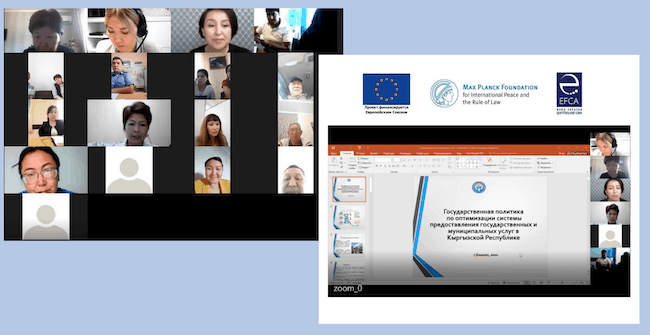The project team conducts online trainings on the application of gender-sensitive approaches in provision of state services
During the period from August 18 to August 21, 2020, the Max Planck Foundation in the framework of the EU-funded “Fighting against discrimination of women from ethnic minorities and ensuring their equal access to public services” in the Kyrgyz Republic conducted a three-hour series of online trainings on the topic “Using a Gender-Sensitive Approach in Provision of State Services” for 42 public officials – 21 women and 21 men – from the Northern and Southern regions of Kyrgyzstan. Online trainings were conducted by two invited local experts – an independent gender expert and an expert of the Center for Public Policy, respectively. Representatives of the Ministry of Labour and Social Development, State Agency for Local Self-Government and Interethnic Relations, Ombudsman of the Kyrgyz Republic, Ministry of Justice, Ministry of Internal Affairs, Ministry of Economy, Prosecutor General’s Office, Ministry of Education and Science, Ministry of Health and other state authorities were among the participants of the trainings.
Implementation of gender-sensitive approaches into the state governance system and local self-government system is aimed at provision of gender equality in all fields of activity of the state. In this regard, the goal of this educational event was to increase gender sensitivity and competence on using the gender-based approaches among state and municipal officials.
During the first day of the online training, the trainers spoke about the state policy in provision of state and municipal services and the Law on Equal Rights and Equal Opportunities for Men and Women in the Kyrgyz Republic. The second part of the webinar of the first day was organized in the interactive form. Participants were divided into groups, and within those groups, they were able to discuss the standards on state services, possibilities of providing online state services (specific examples were used), and apply gender and social analysis during the process of provision of state services. The measures of ensuring equal rights in provision of state services from the perspective of gender and social equality were discussed. During the second day of the online training, a number of presentations were delivered on such topics as standards on state services, including the overview of standards on services, development of necessary measures to implement a gender-sensitive approach in provision of state services. Work in groups was also performed, with participants conducting a gender expertise of standards on state services.

